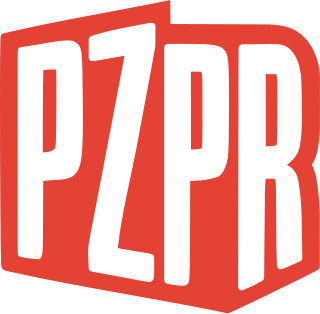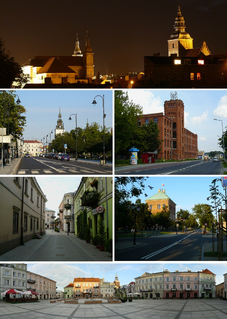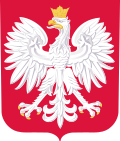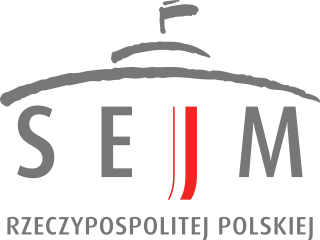Democratic Left Alliance is a social-democratic political party in Poland. It was formed in 1991 as an electoral alliance of centre-left parties, and became a single party on 15 April 1999. The SLD has no representation in the Sejm or Senate following the 2015 parliamentary election. The party is a member of the Party of European Socialists and Progressive Alliance.
The Polish People's Party, abbreviated to PSL, often shortened to ludowcy is an agrarian Christian-democratic political party in Poland. It has 14 members of the Sejm and four Members of the European Parliament. It was the junior partner in a coalition with Civic Platform. It is a member of the European People's Party and the European People's Party group in the European Parliament.

Labour Union is a minor social-democratic political party in Poland. It is a member of the Party of European Socialists (PES).

The Polish United Workers' Party was the Communist party which governed the Polish People's Republic from 1948 to 1989. Ideologically it was based on the theories of Marxism-Leninism. It also controlled the armed forces, the Polish People's Army.

Ostrołęka(listen) is a city in northeastern Poland on the Narew river, about 120 km (75 mi) northeast of Warsaw, with a population of 52,792 (2014) and an area of 33,46 km2. The town is situated in the Masovian Voivodeship, and it is the former capital of the Ostrołęka Voivodeship (1975–1998). Ostrołęka is currently the capital of both Ostrołęka County and Ostrołęka City County. Until the late 1980s, Ostrołęka used to be a local railroad junction, with four lines stemming from Ostrołęka railway station: eastwards to Łapy and Białystok, southwestwards to Tłuszcz and Warsaw, northwards to Wielbark and Olsztyn, and southwards to Małkinia.

In 1989–1991, Poland engaged in a democratic transition which put an end to the Polish People's Republic and led to the foundation of a democratic government, known as the Third Polish Republic. After ten years of democratic consolidation, Poland joined NATO in 1999 and the European Union in 2004.

Piotrków Trybunalski is a city in central Poland with 73,670 inhabitants (2018). It is situated in the Łódź Voivodeship, and was previously the capital of the Piotrków Voivodeship (1975–1998). It is the capital of Piotrków County.

Chełm is a city in eastern Poland with 63,949 inhabitants (2015). It is located to the south-east of Lublin, north of Zamość and south of Biała Podlaska, some 25 kilometres from the border with Ukraine. Chełm used to be the capital of the Chełm Voivodeship until it became part of the Lublin Voivodeship in 1999.

Waldemar Pawlak(listen) is a Polish politician. He twice served as Prime Minister of Poland, briefly in 1992 and again from 1993 to 1995. From November 2007 to November 2012 he served as Deputy Prime Minister and the Minister of Economy. Pawlak is the only person who held the office of Prime Minister twice during the Third Republic, and he remains Poland's youngest Prime Minister to date.
The Rywin affair (Polish: afera Rywina was a corruption scandal in Poland, which began in late 2002 while the post communist government of the SLD was in power. It is named after the prominent Polish film producer Lew Rywin, who was a key figure.
Orlengate was one of the biggest political affairs in modern Polish history. Disclosed in 2004, the scandal began with the arrest, on 7 February 2002, by the Urząd Ochrony Państwa of Andrzej Modrzejewski, the CEO of PKN Orlen. In 2004 the Sejm initiated the PKN Orlen investigation commission to investigate the scandal.

Elections in Poland refers to the election process as well as the election results in Poland. Poland has a multi-party political system. On the national level, Poland elects the head of state – the president – and a legislature. There are also various local elections, referendums and elections to the European Parliament.

Parliamentary elections were held in Poland on 25 September 2005. Thirty million voters were eligible to vote for all 460 members of the lower house, the Sejm and all 100 members of the upper house, the Senate.
Stanisław Józef Łyżwiński is a Polish politician. He was elected to Sejm on September 25, 2005 getting 21101 votes in 10 Piotrków Trybunalski district, candidating from Samoobrona Rzeczpospolitej Polskiej list.

Left and Democrats was a centre-left electoral alliance of political parties in Poland which was created on 3 September 2006, before the Warsaw municipal election of 2006. The coalition's aim was to provide an alternative for both Law and Justice and Civic Platform, which have been Poland's two major political parties since 2005. LiD contested their first national election in October, 2007 and won 53 seats to the Polish parliament, the Sejm. The LiD alliance was dissolved in April 2008, following a rift between the member parties.
The Polish People's Party, existed in post-World War II Poland from 1945 to 1949. In the period of increasing solidification of communist power, but still some formal adherence to multiparty democracy principles, the PSL was a centrist party, non-communist and not allied with the communists. The PSL was defeated by the communist-led bloc in the rigged legislative elections of 1947.
This page is based on this
Wikipedia article Text is available under the
CC BY-SA 4.0 license; additional terms may apply.
Images, videos and audio are available under their respective licenses.















